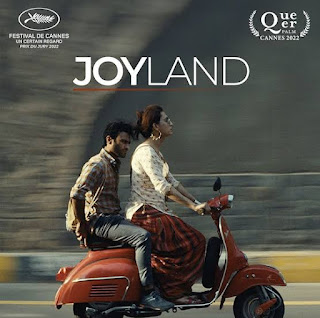I watched Joyland
There has been a huge outrage about the movie Joyland and its storyline. Ever since this movie made its way to Cannes 2022, numerous controversies and conspiracy theories have surrounded it. To add fuel to the fire, Joyland also bagged Queer Palm prize for best LGBTQ, queer, or feminist theme movie at Cannes. As the year progressed, this movie kept making its mark in different international film festivals worldwide for its bold content and controversial storyline. The local media had a mixed response to the movie, but the hype was obviously built through constant reporting and coverage. It got me intrigued and curious about the movie. Therefore, I watched Joyland.
The verdict
In the first fifteen minutes of the movie, I was hooked on the storyline and characters. They seemed authentic and relatable. As the story progressed, it completely lost the original relatability factor. The story is packed with so many elements that you somehow lose track of the main plot. It is difficult to focus on the main idea because there is a spectrum of dark elements in the storyline.
In my opinion, the film is not worth the hype. It is clearly pushing some ideas and they are not entirely related to LGBTQ. The story has many more messed up subplots. Having said that, it is understandable why this movie received so much International recognition; it highlights sexuality in a society that is dominated by religious values, specifically Islamic values. Who would not like such content?
Sexuality is not an issue
The outrage that this movie received was loosely based on the idea that it promotes homosexuality, or validates its premises in the country. After watching the movie, I realized it was just the tip of the iceberg.
Joyland accentuates suppressed sexuality and how people transgress, and break the barriers of religion and culture for pleasure. The movie has also made way for explicit and sexual content in the mainstream entertainment industry. Showing sex is not an issue but as an Islamic republic country, we must identify as such. It should be our unique selling point.
A love letter to Pakistan?
Malala Yousafzai joined the team of Joyland as an executive producer. She labeled the film as a love letter to Pakistan, and the reality could not be any further from that. This film is not at all a love letter. It is sadistic, controversial, and provocative. I really want to ask Malala Yousafzai one question, how is the suicidal ending of a woman wedded to a gay and impregnated in mysterious ways, a love letter to Pakistan?
If anything, it is a heightened alarm for the state of sad affairs in Pakistan. The lack of awareness about transgenders and their sexuality makes the core of the movie, and that is not at all glittery. Pakistan is much more than the darkness this film portrays. I am not against the idea of talking about sexuality through films, but I cannot fight the idea that this film seemed to be a push.





Comments
Post a Comment